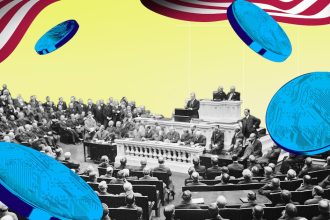Landmark Stablecoin Legislation Would Prioritize Holders Over Banks
Landmark stablecoin legislation, known as the “Genius Act,” would potentially shift financial risk away from banks and onto stablecoin holders in a bankruptcy scenario, according to analysis by experts. If passed by the House without key changes, the bill could create a novel legal precedent with significant implications, Georgetown Law professor Adam Levitin wrote.
The Senate recently passed the bill in a 68-30 vote. The bill would permit banks and other entities to issue or hold stablecoins, provided they meet specific requirements.
How the Genius Act Would Change Things
Under the bill, stablecoin holders would have priority claims to the reserves backing the stablecoins if a bankruptcy occurs. This explicitly favors stablecoin holders over other creditors.
John McCarthy, general counsel of Morpho Labs, explained, “This protects the user of the stablecoin from any eventual bankruptcy of the issuer.” He added this creates tradeoffs, especially concerning stablecoins’ interaction with the banking system and financial stability, noting it reflects a “policy judgment — holder protection comes first.”
The Political Situation
The Senate-passed bill now rests in the House of Representatives. Lawmakers there are working on their own stablecoin bill, known as the “Stable Act,” and could attempt to reconcile the differences or fold the Genius Act into another major crypto legislation known as the Clarity Act.
House Republicans are scheduled to hold hearings on crypto legislation, including the Genius Act, next week.
Stablecoins: A Growing Market
Stablecoins, crypto assets designed to maintain a fixed value (usually pegged to the US dollar), have seen significant growth. The market value grew more than 57% over the past year to reach $255 billion.
Past Crises and Lawmakers’ Motivation
Despite their stability claims, stablecoins have faced significant challenges. In 2022, the Terra USD collapse wiped out billions in investor funds and triggered the fall of crypto exchange FTX. More recently, in 2023, Circle’s USDC briefly plunged amidst turmoil at affiliated Silicon Valley Bank.
These incidents, along with concerns about transparency and punishment levied against stablecoin issuer Tether ($18.5 million penalty in 2021), apparently motivated lawmakers seeking to ensure stability. The Genius Act aims to provide stronger protection against potential crises.
Economists’ Concerns
Levitin argues the bill allows stablecoin holders to “pick up the tab should a stablecoin issuer go bust.” Levitin further commented it effectively allows the “FDIC insurance leak out to cover uninsured stablecoins, without any insurance premiums paid,” noting this is funded by banks rather than taxes.
“Satoshi [Nakamoto] would be turning in his grave to see his vision of an unintermediated p2p payment system be transformed into a centralised system that relies on a forced subsidy from the banking sector,” Levitin wrote, referencing Bitcoin’s anonymous creator.
“What’s thrilling about the bill is not the resolution of a stablecoin bank run, but the vision of precisely how stablecoins should relate to the banking system,” Levitin continued.
Majestic founder Hunter Haidu echoed the sentiment that the bill prioritizes stablecoin redemption ahead of traditional bank deposits.
The bill’s insolvency sections are expected to be among the targets for change as the House drafts its potential counter-bill or reconciliation efforts.












